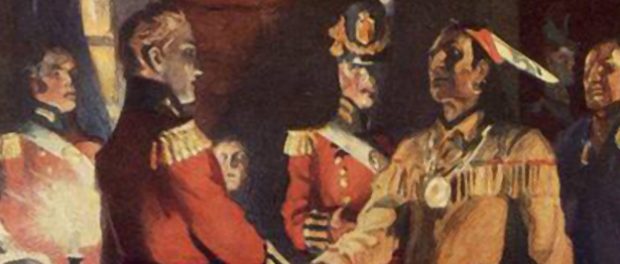1812: Not Only Seven Nations & Other Quebec Curios
Part of “The Canadas in Britain”, 1792-1827
As many history books like to tell us, Canada would not be Canada within the War of 1812. Ostensibly a “Canadian” war, the British spared few British people, instead focusing their energies on defeating Napoleon in the much larger, eponymous Napoleonic Wars (1803-1815). Without the Canadian-British-First Nations alliances, the Canadas well-being would not have been as secure. The Americans, ever the expansionists, especially following the birth of their country, had set their sights on the Canadas and the surrounding territory as Theirs, an idea which the First Nations and the Métis peoples opposed. Their alliance and courage against this common enemy helped ensure a strong fighting force alongside the British.
The Seven Nations of Canada, composed of Mohawk, Huron, Abenaki, and Onondaga nations, were not only a confederation that existed during the War of 1812; they notably helped the French during the Seven Years War; the Mohawk, led by Joseph Brant, would help the Americans during the War of Independence. After the American Revolutionary War, many Mohawks would move to Lower Canada in the Montreal area. The Seven Nations were parties in an ongoing dispute about land claims with the Americans, largely in part since the Native Americans were not a party to the discussions of the Treaty of Paris that concluded the American Revolutionary War.
Like their Iroquois cousins, the Algonquians would form their respective band long before the War, but would similarly ally themselves with the British. Like the Seven Nations, they faced similar frustrations with land claims, having to settle a border dispute in the 1790s with “settlers” that forced the First Nations out of their lands. By 1812, the most recent events troubling the Algonquian confederacy was the American attack on the headquarters of their group that occurred in 1811, an event now known as the Battle of Tippecanoe. The confederacy, vigorously opposed to American expansionism and at that time already considering an alliance with the British, was met by Governor of Indiana, a certain William Henry Harrison and his forces. Harrison would later become the President of the United States. Displaced, the Algonquian confederation would join forces with the British under Sir Isaac Brock at Detroit and play a major part in their victory.
Historians also generally document Métis involvement but has only very recently started to be examined as an important force in their own right. Often serving alongside people of the Seven Nations and the Algonquian confederation, they also served in their own armies allied with the British.
Later this week, we will talk about one of the most famous Aboriginal people involved in the War of 1812: Tecumseh, the leader of the Algonquian confederacy that dissolved with his untimely death.
For a more detailed record about which Nations were involved in the battles of the War of 1812, consult this list here.






